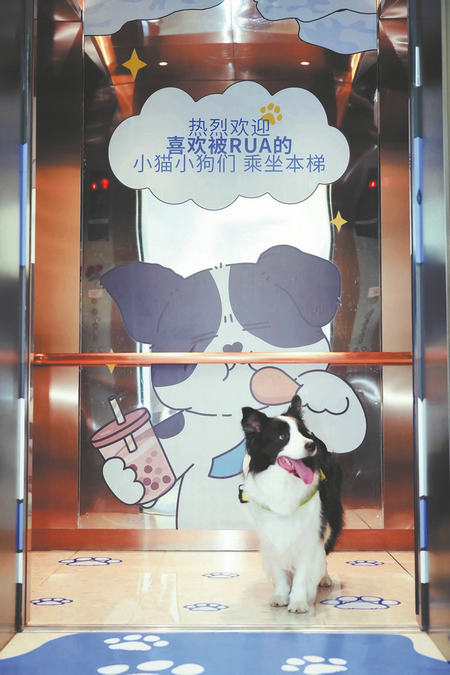'Pet' major launched as demand surges
Major:?Clinical skills, hands-on experience emphasized


China launched its first undergraduate program in companion animal science, also known as the "pet" major, in response to surging demand for trained professionals in the fast-growing pet industry.
The program, officially titled Animal Science (Companion Animals), is a newly added specialization within the broader animal science category at China Agricultural University's College of Animal Science and Technology.
The new major offers another buzz-worthy option for candidates of the national college entrance examinations, and is welcoming the first group of students as the university's admission work this year nears completion.
Liu Guoshi, vice-dean of the college and head of undergraduate admissions, said the new program aims to cultivate graduates who are both scientifically trained and ready for the modern pet economy.
"Companion animals are those that live closely with people and provide emotional support and companionship, such as dogs, cats and horses," Liu said.
The four-year program will enroll 50 students this fall who will study at CAU's main campus in Beijing's Haidian district and continue their studies for the remaining three years at the university's Yantai Research Institute in Shandong province. Graduates will receive a bachelor of agronomy degree.
The curriculum is tailored to the unique needs of the companion animal sector, setting key courses such as companion animal nutrition, pet breeding and reproduction, and pet behavior studies. Students will also study feed safety and quality control, as well as horse culture and the basics of horse racing.
Liu said that while CAU has long offered a traditional animal science major focused on livestock such as pigs, cattle, chickens and sheep, the new track shifts attention to species commonly kept as pets.
"Graduates of the standard animal science major typically enter fields such as animal breeding, feed production or intelligent livestock farming. But graduates of the companion animal program are more likely to work in pet-related companies, veterinary services or equestrian organizations," he said.
The program is being delivered by a strong team of researchers and educators, including Professor Wu Zhenlong, whose work focuses on pet nutrition and gut health, Professor Zhao Xingbo, a specialist in domestication and animal-environment interactions, and Professor Wang Qin, who studies the genetic conservation and breeding of horses.
Though the bachelor's program is new, CAU has already laid a foundation through pilot efforts. The university began offering a companion animal micro-major consisting of nine courses two years ago at the Beijing campus. It has also recruited four consecutive classes of master's students to a similar track at its Yantai branch.
In addition to coursework, the university has created a talent platform that connects students with industry partners for internships and research opportunities. The integration of classroom instruction with real-world experience is critical to preparing students for future careers in this field, said Liu, the college vice-dean at CAU.
According to a white paper on the pet industry, China's pet economy surpassed 300 billion yuan ($41.8 billion) in 2024, with a compound annual growth rate of 11.9 percent in the past decade.
The industry is increasingly driven by pet food, which accounts for 52.8 percent of spending, and rapidly expanding veterinary services. More than 500,000 pet-related businesses are now registered nationwide.
"The pet industry has become a new growth area within the field of animal science and urgently requires a large number of professionals with a background in companion animal science," Liu said, adding that demand for pet-related specialists is increasing steadily at universities, research institutes and veterinary service providers.
"Our goal is to cultivate interdisciplinary talent who understand both the science and the market behind this growing field," he said.
Xia Zhaofei, head of the pet diagnosis and treatment department of the Chinese Veterinary Medical Association, said the demand for professional talent continues to grow with the rapid development of the pet industry. However, the pace of market development still poses a challenge to the supply of talent.
"The current talent training model needs to shift from a focus on academic education to one that emphasizes clinical skills and hands-on experience," Xia said.
Zhang Yi, CEO and chief analyst of iiMedia Research, said that collaboration between industry and academia will be key to future talent development in the pet sector.
For instance, interdisciplinary curriculum design should be introduced to the training system, integrating subjects such as pet care, creative design and digital management. In addition, front-line experts from enterprises should be invited to universities to bridge the gap between theory and practice, Zhang said.
"We can explore a demand-oriented training model, designing courses based on the specific needs of employers to achieve precise alignment between education and industry," he told China Business Journal.







































